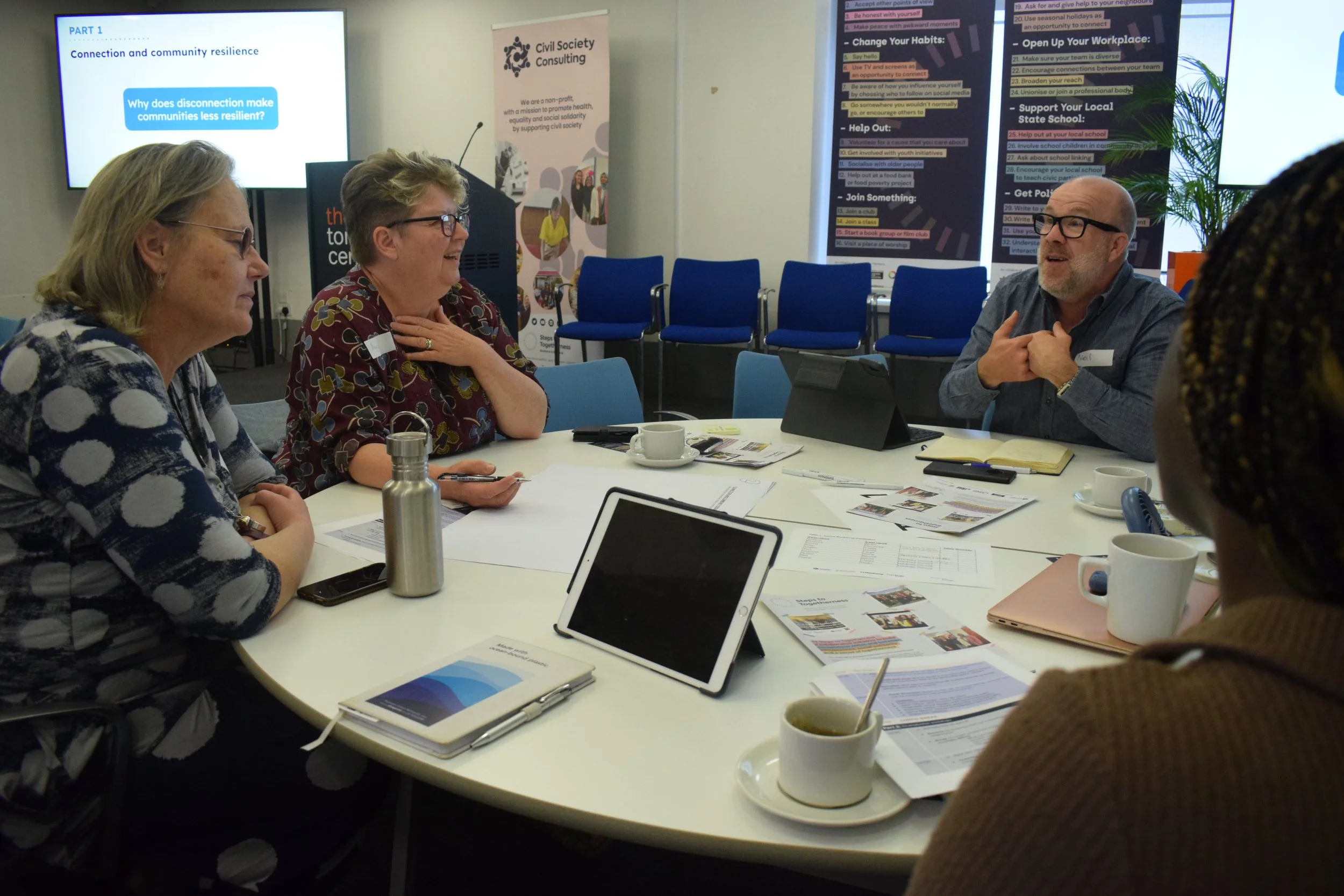BLOG: Fostering Togetherness Through the Workplace
Abigail Harrington opened our (renowned) Togetherness & Economics event earlier this year with a simple, disarming question:
“Would you like to feel more connected to your community — but find yourself lacking the time, money and energy to do so?”
Many of us do. But as Abi reminded us, this isn’t a personal failure. It’s structural. We are living in an economic system that is at odds with connection, community and togetherness. Over lunch, together with Grace Blakeley, Balaka Fell-Holden, Lola Brittain and a brilliant group of participants, we explored How can we foster community and connection in today’s economic system, which intrinsically pushes us toward isolation?
And, even more specifically, given some of the typical challenges many employers are facing, can we work with (rather than against) the system to be part of the solution?
We hosted this event as part of Steps to Togetherness - a national, grassroots civil society movement which aims to build connections within and between communities in order to improve mental health, build social cohesion, and create the conditions for systems change. We’ve come up with 32 ideas for practical actions we can all take - as individuals or community leaders. Abi ( soon to be Dr Abi) is a Labour Market expert who has supported us to understand how the 32 Steps to Togetherness can be useful for employers.
Watch the full recording here:
Why do we need Togetherness?
Most of us can agree our current system is broken. We’ve realised that almost all of the issues we work on have a shared root cause: widespread disconnection and loneliness and the loss of community.
Loneliness is the underlying cause of the epidemic of mental health issues, and rising health inequalities.
Widespread loneliness also creates the conditions for the divisive narratives that are tearing our country apart. Chaos, hatred, weakened democracy, lack of innovation - this is all made possible because being disconnected allows us to become paranoid/distrusting, irritable/angry, with low self esteem and self worth. Sadly, the symptoms of loneliness can bring out our worst side as human beings.
We urgently need connection: within communities, to reduce loneliness and improve wellbeing; and between communities, to foster understanding, cooperation, and peace. This is why we launched Steps to Togetherness.
We’ve been forced to acknowledge that the main thing getting in the way of connection and community is, well, everything: our whole economic system. Therefore, earlier this year we hosted an online discussion with:
Grace Blakeley, journalist, political and economic analyst and author of 'Vulture Capitalism: Corporate Crimes, Backdoor Bailouts, and the Death of Freedom' and 'Stolen: How to Save the World from Financialisation';
Balaka Fell-Holden - union representative for Unison, one of the UK's largest trade unions; and
Lola Brittain - a research assistant on the Fairwork project at the Oxford Internet Institute, focused on the impact of AI system deployment and development on working conditions.
The conversation was facilitated by Abi Harrington - one of our valued Togetherness Advocates - and Natasha, our Founder.
How is our economic system at odds with togetherness?
Experiencing loneliness isn’t a personal failure. It’s structural. We are living in an economic system and culture that is at odds with connection, community and togetherness.
We live in a hypercapitalistic economic and political system, which positions individuals as competitors, breeding mistrust. This system values work and economic value above all else, which encourages us to work long hours, often under high pressure, and overwork, leaving little energy for meaningful connection. Over time, hypercapitalism allows inequalities to widen and deepen, which means many of us are facing the brunt of the cost of living crisis.
Hypercapitalism also comes hand in hand with narratives of individualism, self-reliance, and independence - which encourage us to live more isolated and individualised lives. Natasha, Founder of Civil Society Consulting, picks on lawnmower companies to demonstrate how this works. People in the same neighbourhood could theoretically share a lawnmower, saving money and becoming closer to one another. However, if that was the case, lawnmower companies would sell just one lawnmower, rather than, say, 36! Therefore, businesses have been intrinsically motivated to promote narratives of individualism.
We don’t wish to sound radical. We’re just saying it how it is!
A surprising alignment: building connection through the workplace could benefit individuals, employers and society
Our hypercapitalist system may well be tripping itself up. Abi Harrington - a Labour Market expert and soon-to-be Dr - has supported us to understand how the system itself is beginning to suffer as a result of the lack of connection, community and togetherness. Employers are facing many challenges around employee retention, wellbeing and productivity. At our online discussion, Abi explained that many of these issues major employers are facing would be remedied by building connection, community and a greater sense of togetherness.
We could all benefit by building more connection (within and between communities) through the workplace. There is a lot of potential to do so. Work is an opportunity to bring together people who might not normally come together, together. Plus, we spend a lot of time working, so even small changes to the work environment have a big impact on our lives. Therefore, perhaps we can rebuild our country’s social fabric through the places where people spend their lives.
Abi concluded with this insight:
“Maybe workplaces are one of the most powerful places we have left to build community.”
And that became the central takeaway of the event.
Offering up 32 Steps to Togetherness to workplaces
As part of Steps to Togetherness, we’ve come up with 32 ideas for practical actions we can all take to build connection: 32 Steps to Togetherness. The 32 Steps provide practical, actionable guidance for individuals and community leaders full of ideas for how we can foster more connection. This is a free resource, which we welcome all employers to take up as a useful resource.
If you’d benefit from a helping hand, keep reading…
Are you an employer that wants to take togetherness seriously?
If you are a team manager or employer keen to build more connection in your workplace, we encourage you to invite us in to deliver a Togetherness workshop with your team.
In response to what we learned, Civil Society Consulting is now offering Togetherness Workshops specifically designed for workplaces, which we have trialled and tested with a whole range of organisations and people
We’ll bring everyone on a shared journey through the togetherness concepts, and bring the 32 Steps to Togetherness to life for your team. The workshops are expertly facilitated by Natasha, shaped around the experiences of your employees and what matters to them.
This goes beyond “team building” to create the springboard for genuine cultural transformation. At the same time, you’ll be helping to rebuild our country’s social fabric.
Other learnings from the panel
Balaka Fell-Holden:
Libraries are pillars of civil society
Libraries promote democracy, equality, and informed citizenship by providing free access to information, learning, and community spaces.
From story times to coding clubs and digital skills sessions, libraries help people of all ages and backgrounds learn and access opportunities, empowering working-class communities.
They respond to community needs, hosting refugee hubs, English classes, civic discussions, and lifelong learning programmes, fostering social cohesion and resilience.
However, with 26% of staff cut in 2023 and rising demand, libraries face an uphill task in meeting expanding social roles.
The invisible workforce of unpaid carers
Drawing on personal experience, Balaka highlighted the vital yet often overlooked contributions of the UK’s five million unpaid carers, who provide support, advocacy, and skills training. The “Triangle of Care” emphasises centering the vulnerable person and improving collaboration with professionals.
Lola Brittain:
Research undertaken by the Fairwork Project highlights how digital platforms are reshaping work—and not always for the better. Their research shows gig workers face three major challenges:
Isolation: Workers are often alone, managed by algorithms, and pitted against each other.
Precarity: Unpredictable hours, low pay, and minimal protections make work insecure and exhausting.
Lack of voice: As independent contractors, gig workers have little access to collective bargaining or workplace democracy.
To address these challenges, Fairwork engages multiple stakeholders through its theory of change: rating companies publicly to incentivize improvement, supporting policy development, empowering workers and unions with research, and educating consumers. The project has driven over 300 positive changes globally.
Grace Blakeley:
The economic and political shifts of the 1980s—exemplified by leaders like Thatcher and Reagan—deeply shaped contemporary experiences of isolation, alienation, and powerlessness. Contrary to the rhetoric of free markets and personal freedom, these changes concentrated economic and political power in the hands of a few, fostering oligarchic systems rather than true market democracy.
Neoliberal reforms were not only about deregulation or privatisation but also about reshaping social life:
From worker to investor/entrepreneur: Individuals were encouraged to see personal prosperity tied to asset accumulation and market success rather than collective labour action. Those who struggled were often blamed for their own “failings.”
From citizen to consumer: Political engagement was reframed as consumer choice rather than collective influence, weakening grassroots movements and mass political organising.
From community to household: Policy, housing, and economic shifts fragmented communal life, undermining spaces for collaboration, solidarity, and local organising.
Grace argues that these shifts were deliberate, combining “carrots” (opportunities for individual gain) and “sticks” (weakening unions and local power) to foster competitive individualism. The result is a society where alienation, loneliness, and inequality are not accidents but systemic tools that benefit the powerful.



